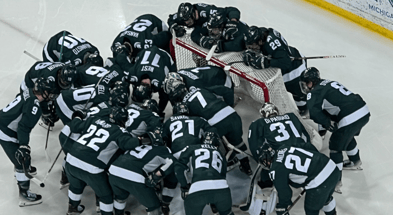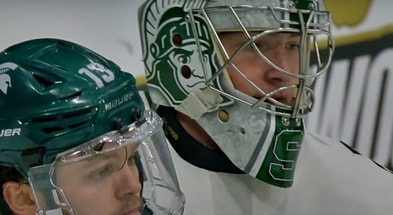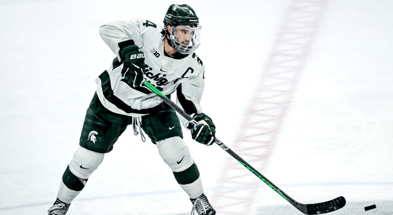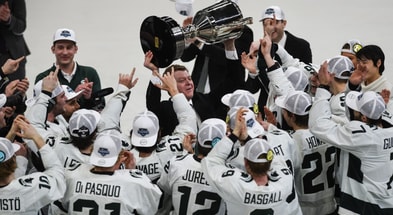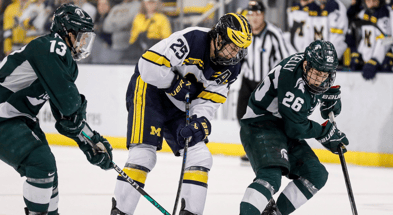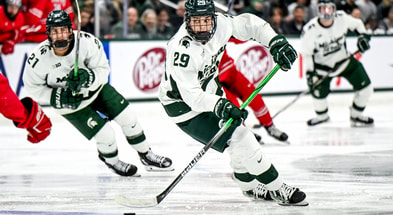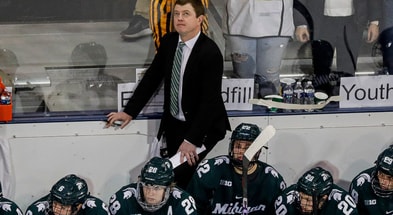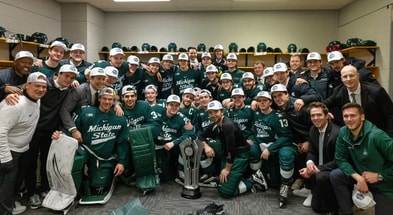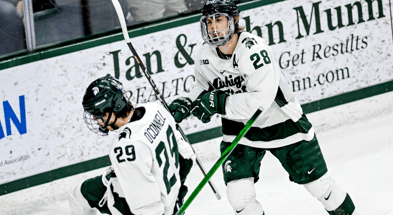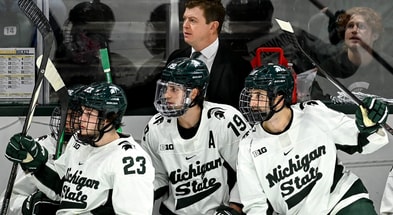Q&A with Michigan State's Adam Nightingale at mid-season, heading into GLI tourney in Grand Rapids
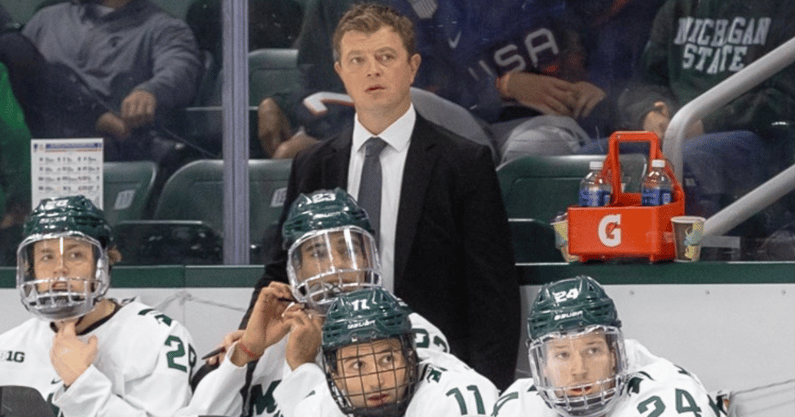
East Lansing, Mich. – Michigan State hockey coach Adam Nightingale grew up thinking Santa Claus must have been a pretty big college hockey fan. How else could you explain the tickets to the Great Lakes Invitational that Nightingale used to get in his stocking every Christmas morning as a child, growing up in Cheboygan, Mich?
Nightingale and his brothers grew older and wiser to the ways of Christmas giving, and their parents’ affinity for the traditional holiday hockey tournament. Nightingale has been a part of the GLI as a young fan, a young prospect, a player, an assistant coach and this year he will pilot the Spartans as a head coach at the GLI for the first time.
The GLI is moving from its Detroit roots to Grand Rapids this year for the 57th renewal of college hockey’s best holiday tournament.
The field is strong, despite Michigan’s exclusion, with Michigan State, listed No. 8 in the NCAA Pairwise rankings, heading to Beer City along with No. 18 Michigan Tech and No. 23 Western Michigan.
The Spartans (12-7-1) will play Ferris State (8-8-2) in the semifinals at 7 p.m. on Tuesday at Van Andel Arena in Grand Rapids (No TV). Host team and GLI originator, Michigan Tech (10-4-3), will play Western Michigan (10-9-1) at 3:30 p.m. on Tuesday.
The consolation and championship games will be played at the same times and location on Wednesday.
Michigan State is the surprise team of college hockey through the first half of the season. Now, the Spartans get their last chance in the regular season to get a pair of non-conference wins, which are crucial in the Pairwise Rankings, which determine berths in the 16-team NCAA Tournament.
Teams that finish in the Top 12 of the Pairwise Rankings usually are on the safe side of the NCAA Tournament fence, which makes this weekend’s GLI vital to Michigan Tech and Western Michigan as well.
Prior to Nightingale and the Spartans boarding the team bus at Munn Ice Arena on Monday for their trip to Grand Rapids, SpartanMag publisher Jim Comparoni was able to pull Nightingale aside for a Q&A to discuss the key factors that have enabled Michigan State to become the surprise of college hockey midway through the 2022-23 season.
Jim Comparoni: You have 10 players regularly seeing playing time who weren’t on the team last year. Some were committed to Danton Cole and the previous staff. Some were evaluations done in short order by you and your staff. Let’s start there and how this has all come together so quickly.
Freshman Karsen Dorwart is tied for your team lead in goals (7) and is tied for the team lead in points (18). He’s from Sherwood, Ore., by way of Sioux Falls in the USHL. How did you get him to come to Michigan State after being hired so late in the hockey calendar on May 3?
Adam Nightingale: When we hired (associate head coach) Jared DeMichiel, we knew we needed a center. Hiring a staff, I needed guys in the college game that could hit the ground running in recruiting. That was important. Karsen was a guy that didn’t play the COVID year because he was in prep school and a lot of those seasons were canceled in the East. Then he went to the USHL. To not play hockey for a year and then hop into the USHL is a huge jump. I think he had like two points at Christmas, and then he had 20 after. So he looked like was a guy that was going to pop.
We had him out on a visit. He loved it and committed. Coming in, we just told him we needed a center. It’s going to be competitive to compete for a spot in the lineup. He certainly has done all of that.
JC: Earlier in the season, you said you didn’t necessarily view the Dorwart/Daniel Russell/Jagger Joshua line as the No. 1 line, although they rep that way. You said you wanted more than one No. 1 line. Do you still feel that way?
AN: There are nights for sure when they play like our top line. And there are times when Nicolas Müller’s line plays like the top line. Jesse Tucker’s line has played well here, coming on. More nights than not, they have been (the No. 1 line), but that’s what I like about our team. We have some depth.
That’s the next step for those guys now. They aren’t sneaking up on anyone in the second half. They know who Karsen is, they know who Russ is, they know who Jags is. That depth will be important.
JC: Daniel Russell’s father, Kerry, played here. Now, Daniel leads the team in scoring with 19 points as a freshman. Was there any trouble getting him to come to Michigan State?
AN: He had been committed for a long time, going back to early on with Danton. The one thing with Russ, it’s not like he had an easy path here. He grew up in Traverse City. Not a lot of college hockey players come out of Northern Michigan. His family drove him down to Grand Rapids to play youth hockey. Then he went to USHL, then he went back to NAHL, then worked his way back to the USHL. When you have a guy who has had to battle, scratch and claw, that’s why he has the approach he has. He has a humble approach. He knows he has to keep earning it, which I like a lot.”
JC: You brought in Miroslav Mucha as a grad transfer from Lake Superior State and a native of Slovokia. He turned 25 in October and quickly became a captain here. Did you expect him that kind of leadership out of him right away?
AN: Oh yeah. I’ve known him since he was 15-years-old. He was at Shattuck St. Mary’s when I was at Shattuck. I didn’t coach him but I was in charge of all the skills for the whole program and he would meet me at the rink at like 6 in the morning and we’d skate. So we had a relationship for a long time. I kind of followed his career. Occasionally when I would be over in Europe for World Championships, I would run into him.
He popped up in the portal. I knew we wanted him. He’s a really good person, a really good player. We knew we wanted him to be a part of it.
When we brought him in, it wasn’t like we said, ‘Hey, this is going to be our captain.’ I saw how he worked with our guys, and we had a team vote, and he’s been a great leader. I knew he had leadership qualities. He was an assistant captain at Lake Superior State on an NCAA Tournament team. I think he’s done a heck of a job for us.”
JC: That’s amazing that a transfer could come in and win over a locker room and be voted captain in his first year. Russell Wilson did that as a quarterback at Wisconsin, but it’s rare:
AN: Big-time. No doubt. And I think he stands for everything we want this program to stand for. It’s not about him. He’s a worker. Expects zero special treatment. Super appreciative of everything we have here, coming from Lake State. So it’s been a great fit.
JC: How many of the key newcomers were uncommitted when you were hired?
AN: The guys that we got were Dorwart, (defenseman) Viktor Hurtig, the Krygiers were on the fence. We brought them back. Mucha. (Goalie) Dylan St. Cyr.
JC: Zach Dubinsky (from RPI), Michael Underwood (from Clarkson) and Justin Jallen (from Brown) were already coming here from the portal prior to your hiring. Forward Tiernan Shoudy and defenseman Matt Basgall were already committed to be incoming freshmen. So you had to re-recruit those guys?
AN: Yes. I think they wanted to come. It was a process of making sure it was a fit. When I got the job on May 3, the portal had opened on May 1, so it was picked over.
Dylan St. Cyr was still there in the portal. He was going to go play pro. He was done with college. There were some phone calls. We talked and we were super fortunate to get him.
I told him we’ve got a spot. I’m not guaranteeing you will be the starter. You have to come here and earn it. But I know you’re a really good person. You’re what we want the culture to be around here. I’m happy we got him.
JC: Shoudy, from St. Clair, Mich., is a scrappy freshman who ranks high in plus-minus. He was a commitment on your way in, what did you hear about him?
AN: We played against Shoudy with the National team. I talked to Kris Draper. He had coached him at Little Caesars. He said, ‘Nighty, you’re really going to like him. He’s really competitive.’
I think he’s an important piece.
JC: In what ways?
AN: Shoudy is very smart. He is very competitive. He can play up and down your lineup. He is playing wing now, but he can also play center. He’s a guy that can play on the power play. He hasn’t done it a ton, but he can do it. He kills penalties so he is super valuable, especially as a freshman coming in.
JC: And Basgall, from Lake Forest, Ill., was committed to Michigan State’s previous staff. What were you hearing about him?
AN: I knew his advisor. So when I got the job, he called me right away and said, ‘Hey, you’re going to love this kid.’ I trusted his advisor.
He’s a leader. That whole class, that’s a good freshman class, a good base. So he’s another one that has had a good start.
Top 10
- 1Breaking
March Madness
NCAA Top 16 seeds revealed
- 2
Brad Stevens
Makes Indiana intentions clear
- 3
Auburn vs. Alabama odds
Point spread released
- 4
Dawn Staley
Admonishes rev-share reversal
- 5Trending
Joel Klatt
NFL Mock Draft
Get the On3 Top 10 to your inbox every morning
By clicking "Subscribe to Newsletter", I agree to On3's Privacy Notice, Terms, and use of my personal information described therein.
JC: In terms of areas where you have impressed, I notice your team completing a lot of passes coming out of your own zone, playing really well with the short passes coming out. When you talk about the style of play that you’re instilling, is this a part of it? Has that been a factor in the surprising success of your team to this point? Am I wrong about that?
AN: No. Our first two drills every day, there is no goalie involved, it’s all passing and puck possession. We commit to it.
I told our guys, you want to play in the NHL? There are 900 pass attempts in an NHL game. 900. So if you can’t master that … and I think it’s one of the most under-appreciated skills in the sport, and not worked on enough at a young age. Everyone has a skating coach. They have a stick-handling coach. They have a shooting coach. But really, passing and receiving the puck is very important.
If you put an NHL coach out at our practice, he wouldn’t say, ‘Wow, that guy skates different. That guy shoots different.’ But you watch them pass a puck and handle a pass – it’s light years ahead of a college player.
Teams I’ve coached, I’ve always tried to emphasize that part of the game. Guys have done a good job. We still have room to grow on it but certainly that’s how we want to play.
The amount of touches our guys get passing the puck, if we didn’t do that the first two drills … you’re talking about 10-times the number of touches you would normally get through the course of a year. You talk about trying to help players develop, I think that’s a big piece of it.
JC: Did you develop those drills?
AN: There are other coaches that do it. When I was coaching at Shattuck, I had the 2000 group bantam team and we won a ton of games and lost only five or six, and we got to the national tournament and I said to myself, ‘We’re not a team. We don’t pass the puck.’ And we lost.
We played way too much one-on-one hockey. I’m like, ‘I’m never going to let that happen again.’ So that next year with the ’01 team, we committed to that. When I was with the National Team, same thing. And I think that’s one of the hardest thing with the National Team is that you have all of these high-end players that can do it on their own, but every level that you go up, you need your teammates more. You can’t do it on your own. The guys on the National Team were close to the NHL level so we needed to train them in that environment in terms of playing team hockey, passing, and puck support.
So I did that the last two years with our National Team and we had six first-rounders and 16 first-rounders.
These kids here have done a great job of buying in. It’s not warm-up. I would argue it’s the most important part of practice.
JC: They are seeing the results?
AN: Yes. I think the guys that have been in college a long time are like, ‘Man, I wish …’ Look at a guy like Jagger Joshua. Jagger is touching the puck way more. He has his head up, and a handle to receive it, and make the next play. I think there’s a correlation to him producing more. His stick is getting better.
JC: Am I noticing defensemen carrying the puck more? I see the Krygiers carring it in more?
AN: Yeah, we want to play fast. We want to move it up to our forwards if we can but when we have the puck we want all five guys on offense. I think players get excited about that. But when you don’t have the puck, we also need all five guys committing to the defensive side of the puck.
Certainly having the D as part of our offense is important.
JC: Is there more of that this year from those defensemen?
AN: I don’t know. I didn’t watch one bit of film from last year. I didn’t ask. I was just like, ‘This is how we are going to do it.’
JC: In August, you talked about the importance of conditioning in playing the style you want to play. What is it about your style of play that requires more conditioning?
AN: We want to create time and space when we have the puck, and eliminate time and space when you don’t have the puck. To do that, you have to be in great shape. You have to keep your shifts short, too. But you have to be in condition. That’s one thing that I feel like has been a competitive advantage. I feel like we’re in good shape. Especially right off the bat, at the start of the season. Some of that evens out as teams play a lot of games.
But just playing fast is part of it too. Playing fast with the puck and playing fast without it.
JC: Did you get a chance to recruit here in the last couple of weeks?
AN: Yes. We’re being received well. People are excited. Obviously it’s still early. We’ve put our head down and worked but we see now that a lot of people are shocked. They didn’t think that this team would be good. And it’s still only halfway through the season. But it’s a testament to these guys. They want to be a team. You have to have that chip on your shoulder to prove people wrong, and in the first half, they’ve done that.
JC: How important is it to win the Great Lakes Invitational?
AN: I just want us to play well, play our best game of the year. Throughout the season, not that we haven’t had any steps back, but I really think if look back, we lost our exhibition game to the National Team, we lost our opener to Bowling Green. Then we went to Bowling Green and won – hard rink to win in. We kept building, kept playing better. We lost 5-0 to Notre Dame, and then came back the next day and won on a shootout. We had a good stretch there in November when we were winning some games. But we kept playing better and better. That will be the focus again this weekend. Tournament or not, we want to play our best game.
JC: With the success you had in the first half of the season is it a task to keep everyone centered and focused without looking too far ahead?
AN: It was a good first half of the season for us. I think one of the dangers for any team or individual is listening to outside noise. When things go well, people tend to tell you how good you are and it can go the other way, too, when they don’t go well. We are trying to take an even-keel approach and just focus on the things that we can control – our effort and attitude, and tune out the outside noise and try to get better every day.
JC: You know the tradition that the GLI had in Detroit. You’ve been a part of it on many levels. Now that it’s moving to Grand Rapids, with a strong field in its first year there, how much of a sense of ownership do you feel in trying to get a new tradition started in Grand Rapids with the GLI?
AN: It’s Michigan Tech’s tournament. Thankfully they invited us to play in it. In partnering with Michigan Tech, when you look at Michigan Tech – unbelievable program and they travel really well. They have a passionate fanbase. And then you take two teams from the west side of the state in Ferris and Western, and we have a ton of alumni in the west side of the state. The last time I looked at ticket sales they were pretty good. Taking some ownership in there and trying to build it, I think it could be a really special tournament.
I think it’s great. G.R. is such a great hockey town with the Griffins there. It’s a great venue. To put quality opponents in this tournament, it’s really an exciting time for the GLI.

